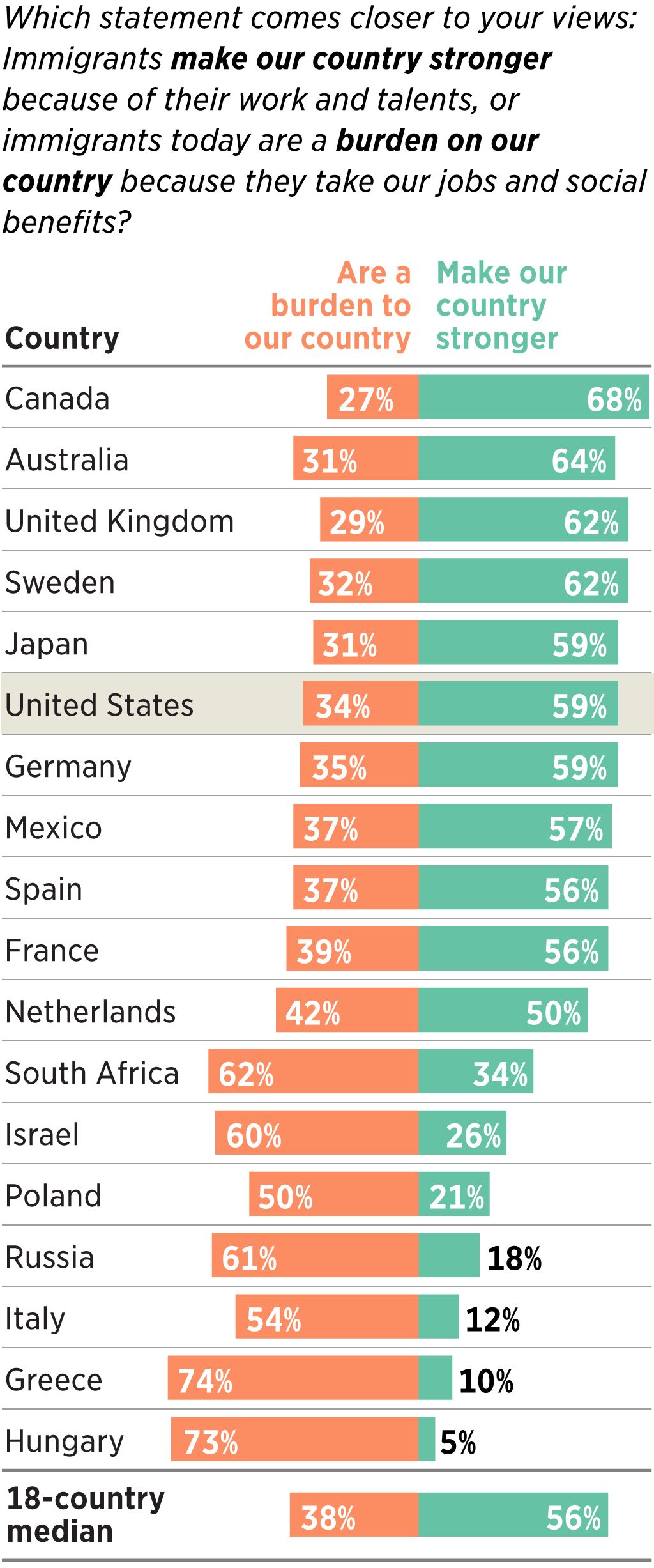Study: Most Americans say immigrants make the country stronger
The Pew center surveyed 18 countries that host roughly half of the world’s migrants, or some 127 million people.
/arc-anglerfish-arc2-prod-pmn.s3.amazonaws.com/public/3II52WJXW5FZVCYT4R4422URZY.jpg)
Americans admire immigrants more than it might seem, given calls for tougher enforcement, with 59 percent saying the newcomers make the country stronger, according to a new Pew Research Center study released on Thursday.
The same is true in many countries around the world, according to the Washington-based think tank, which found that more people say immigrants are a strength than a burden.
The center surveyed 18 countries that host roughly half of the world’s migrants, or some 127 million people.
In 10 of those nations, majorities saw immigrants as a strength. Those lands included some of the world’s largest receiving countries, including the United States, Germany, the United Kingdom, France, Canada and Australia.
Majorities in five countries — Hungary, Greece, South Africa, Russia and Israel — saw immigrants as a burden.
Attitudes on Immigration Around the World
A survey of 18 nations that contain more than half of the world’s migrant population shows that a majority of their residents say immigrants strengthen their countries.

Which statement comes closer to your views: Immigrants make our country stronger because of their work and talents, or immigrants today are a burden on our country because they take our jobs and social benefits?
Pct. of
world’s
migrants
Foreign-born
population
Are a burden
to our country
Make our
country stronger
Country
27%
68%
Canada
7,860,000
3%
31%
64%
Australia
7,040,000
3%
29%
62%
United Kingdom
8,840,000
4%
32%
62%
Sweden
1,750,000
<1%
31%
59%
Japan
2,320,000
<1%
34%
59%
United States
44,410,000
18%
35%
59%
Germany
12,170,000
5%
37%
57%
Mexico
1,220,000
<1%
37%
56%
Spain
5,950,000
2%
39%
56%
France
7,900,000
3%
42%
50%
Netherlands
2,060,000
<1%
62%
34%
South Africa
4,040,000
2%
60%
26%
Israel
1,960,000
<1%
50%
21%
Poland
640,000
<1%
61%
18%
Russia
11,650,000
5%
54%
12%
Italy
5,910,000
2%
74%
10%
Greece
1,220,000
<1%
73%
5%
Hungary
500,000
<1%
18-country median
38%
56%

Which statement comes closer to your views: Immigrants make our country stronger because of their work and talents, or immigrants today are a burden on our country because they take our jobs and social benefits?
Are a
burden to
our country
Make our
country
stronger
Country
Canada
27%
68%
Australia
31%
64%
United Kingdom
29%
62%
Sweden
32%
62%
Japan
31%
59%
United States
34%
59%
Germany
35%
59%
Mexico
37%
57%
Spain
37%
56%
France
39%
56%
Netherlands
42%
50%
South Africa
62%
34%
Israel
60%
26%
Poland
50%
21%
Russia
61%
18%
Italy
54%
12%
Greece
74%
10%
Hungary
73%
5%
18-country
median
38%
56%

The new findings could appear to conflict with a December report in which Pew found that only 24 percent of Americans wanted more immigrants to come to the country. Nearly three-quarters said they wanted immigration into the U.S. to decrease or stay at the current level.
“The findings are not contradictory,” said Senior Researcher Phillip Connor, “as the questions look at two very different issues.”
The earlier study addressed the future movement of immigrants into the country, he said, where the new report asks about those already living in the U.S.
Both reports arrive at a time of often wrenching worldwide migration, much of it driven by war and poverty, and as President Trump continues to push for construction of a wall on the nation’s southern border.
Those who wanted fewer immigrants arriving in their nation were less likely to see immigrants as making their countries stronger.
Majorities in most destination countries support the deportation of people who are there without government permission. In the U.S., opinion is divided, with 46 percent wanting to deport undocumented immigrants, and 47 percent opposing that step, the study found. Pew estimates that 10.7 million undocumented immigrants were living in the U.S. in 2016, a number that’s been falling since 2007.
Russia was surveyed since it has one of the world’s largest foreign-born populations. South Africa continues to be a top destination for many Africans. Mexico has become an increasingly important stop for people fleeing violence in El Salvador, Guatemala and Honduras. Similarly, Hungary became a significant transit country for migrants entering Europe during a refugee surge in 2015.
In the U.S., roughly six in 10 adults said immigrants make the country stronger because of their work and talents, while one-third said immigrants are a burden because they take jobs and social benefits.
In most of the countries surveyed, those on the left of the political spectrum were more positive about immigration than those on the right, the study said. Similarly, in many countries, younger people, along with those with higher incomes and higher levels of education, were more likely to see immigrants as making their countries stronger.
Pew queried 19,235 people around the world between May 14 and Aug. 10, 2018.
Public attitudes were split on the willingness of immigrants to integrate into society.
A median of 49 percent among surveyed countries said immigrants want to be distinct, while a median of 45 percent said they aimed to adopt the host nation’s customs and ways.
An outlier was Japan, where 75 percent said immigrants aimed to adopt the nation’s customs. That country, faced with an aging population and low birth rate, has changed some policies to try to attract more foreigners.
In eight destination countries — Hungary, Russia, Greece, Italy, Germany, Poland, Israel and Australia — more people said immigrants sought to keep themselves apart.
The study also looked at how people view immigrants and crime. In several destination countries, large majorities said immigrants are not more to blame for crime than other groups. This included the U.S., Canada, France and the UK.
Among other countries, only in South Africa, Sweden and Greece do majorities believe immigrants are more to blame for crime than other groups.